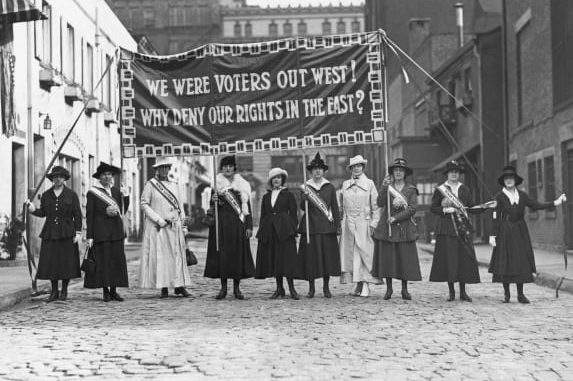Spotlight on America: On This Day: 19th Amendment ratified thanks to one vote

A dramatic battle in the Tennessee House of Representatives ends with the state ratifying the 19th Amendment to the United States Constitution on August 18, 1920. After decades of struggle and protest by suffragettes across the country, the decisive vote is cast by a 24-year-old representative who reputedly changed his vote after receiving a note from his mother.
America’s suffrage movement was founded in the mid 19th century by women who had become politically active through their work in the abolitionist and temperance movements. In July 1848, 200 woman suffragists, organized by Elizabeth Cady Stanton and Lucretia Mott, met in Seneca Falls, New York, to discuss women’s rights. After approving measures asserting the right of women to educational and employment opportunities, they passed a resolution that declared “it is the duty of the women of this country to secure to themselves their sacred right to the elective franchise.”
For proclaiming a woman’s right to vote, the Seneca Falls Convention was subjected to public ridicule, and some backers of women’s rights withdrew their support. However, the resolution marked the beginning of the woman suffrage movement in America.
When Carrie Chapman Catt took over from Anthony as President of the National American Woman Suffrage Association in 1900, she prioritized the push for a constitutional amendment to give women the vote. At the outset of World War I, NAWSA urged women to prove their worth to the war effort while the National Women’s Party, led by Lucy Burns and Alice Paul, engaged in civil disobedience, directly targeting President Woodrow Wilson with protests outside the White House.
Finally, facing growing pressure on multiple fronts, Wilson called a special session of congress in May of 1919 and personally appealed for women’s suffrage. Having voted down the amendment six times, Congress finally approved it, sending it to the states for ratification.
By March of 1920, just one more state was needed to ratify the 19th Amendment in order for it to become law. The Tennessee General Assembly took up the question in August, and suffragists and anti-suffragists bore down on Nashville. The State Senate voted convincingly to ratify, but the House failed to do so twice, by two votes of 48 to 48. State Rep. Harry T. Burn, a 24-year-old from McMinn County, was one of the “nay” votes. Reportedly, he had intended to vote for ratification but had been persuaded not to by telegrams from his constituents and members of his party.
Just as a third vote was set to begin, Burn received a letter from his mother, Febb Ensminger Burn, that read, in part, “Hurrah and vote for Suffrage and don’t keep them in doubt … I’ve been watching to see how you stood but have not seen anything yet … Don’t forget to be a good boy.”
On the third vote, Burn changed his mind. Thanks to his single vote, the House approved the amendment, Tennessee ratified it, and the Constitution was changed to guarantee women the right to vote.
On August 26, the amendment was formally adopted into the Constitution by proclamation of Secretary of State Bainbridge Colby.
Despite the ratification of the amendment and the decades-long contributions of Black women to achieve suffrage, poll taxes, local laws and other restrictions continued to block women—and men—of color from voting. It would take more than 40 years for all women to achieve voting equality.
Photo and Link: https://minuteman-militia.com/2020/08/18/on-this-day-19th-amendment-ratified-thanks-to-one-vote/




